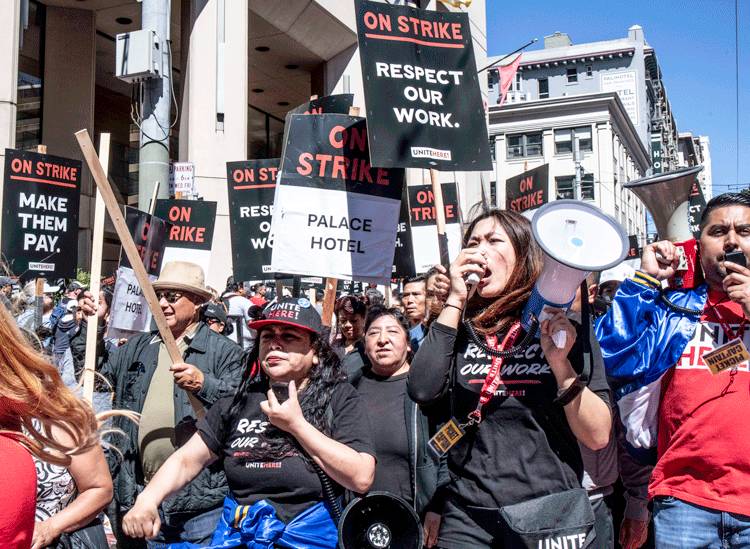The things that unite socialists on a world wide scale are today precious and rare. The 1st of May is such a day and we commemorate everyone that has fought for their rights against this usurping system that is bringing our world to the brink of existence. The fight for workers rights is just and important but in the paradig of democratic modernity the criticism the workers’ movement is given is also important.
But with criticism we grow and transform ourselves and fund new ways to confront the crises of capitalist modernity. We have had the opportunity to talk to friend organisations that conduct a workers struggle and all of them have different approaches to what it means to organise a struggle against exploitation in our era. As Rosa Luxemburg taught us, we, the “non-capitalist” part of society are more than just workers and we are arguably an immense part of society. Without thinking outside of the worker-capitalism frame of mind, we will lack in our explanation of the reality of oppression and our proposal of a way out of exploitation.
We had conversations with four activists from Italy, Sweden and Greece involved in worker’s struggles: the Syndicalist Central Organization of Workers in Sweden (SAC), the Rocinante Anarcho-Sindicalist Union in Greece, and two local workers unions in Italy, Suddcobas and Multi. We asked them how they assess the challenges and opportunities for workers struggles nowadays, how they relate to women and society liberation and what are their perspectives for both local and international organizing. The rise of authoritarian regimes and of the war industry, together with the impoverishment of the working people were central topics. We also discussed the role of women’s organization, as a key liberation struggle to tackle all forms oppression and exploitation. Finally, all four stressed the importance democratic and emancipatory local organizing articulated together with a strong international movement.
Rise of militarism, of authoritarian regimes and deepening of exploitation
Rocinante from Greece mentions the intersecting facets of the multi-crisis of the system: the escalating cost of living, housing precariousness, state repression, technological exploitation in the workplace, and ecological collapse. Another aspect of this crisis is the militarization, they continue: “Globally, we’re seeing increased militarization and war, which go hand in hand with the economic logic of profit and imperial domination.” In Italy, the ever growing militarization of society also affects the working class, as Multi explains: “Rearmament must be understood as an immense theft and financial expropriation to the social wage for the purchase and investment in weapons: subtraction of wealth expressed in services, health, education, environmental need. There is a powerful industrialist reorganization towards a function of war: conversion to the military, detour of the purposes of civilian infrastructure to military use; and as a war mentality imposed on society and the working class: identifying with the ‘superiors’, competition, disciplining.”
Regarding the rise of authoritarian regimes, SAC highlight the following: “Authoritarian governments are orchestrating an attack on democratic rights and institutions, many of which have been brought about by working-class movements. It is sad that parts of the working class are lured into thinking that authoritarian regimes can help them out of the crisis they are experiencing, but clearly this won’t be the case. This is the breeding ground for war and fear, not peace and happiness. Radical working-class movements are crucial to avoid degeneration into barbarism.” SAC calls for a radicalization of working-class resistance to the authoritarian threat, turning it into an active struggle for self-determination. “This is crucial for any move toward a free society. It can happen through collective action at the workplace but also in neighborhood councils, rent strikes, or campaigns for affordable living.”
Mental struggle against individualization
These evolutions go hand in hand with a mentality of individualization, weakening the social tissue and the capacity of collective resistance. SAC from Sweden believe that “the biggest one is the neoliberal era having successfully eradicated the belief in collective action. Individualization has led people to believe that they can only solve their problems individually.” The Italian activists from Multi see this evolution in a global context: “In the period of World War III, the violent competition between states, capitalist enterprises and blocs is reflected in society and the working class is manipulated through ‘social cannibalism.’ The pedagogy of cruelty is the grammar that describes the organization of labor in any context. Lack of solidarity and recognition, overwhelm and lack of reciprocity, harassment and objectification of relationships are the basis of any social and economic context. Our task is to de-naturalize these aspects, empowering a perspective of unity and common interests.”
Women’s struggles
The specific exploitation targeting women was also mentioned, as domestic and reproductive labor remain almost exclusive domains of women. More broadly, we discussed the key role of women liberation for social liberation, in relation to Öcalan’s ideas. “Öcalan’s insight—that patriarchy predates and underpins class society—is crucial. The domination of women was the first institutionalized oppression, setting the stage for broader systems of hierarchy and control. Capitalism has always relied on gendered labor divisions. Without confronting patriarchy, the working-class struggle is hollow.” said Rocinante.
The Suddcobas trade union developed how the workplace is also a place of struggle for women: “The union in the workplace can be a very important space of organization for women: women often experience specific conditions of exploitation, related to care work or the so-called ‘feminized work,’ characterized by lower wages and impositions of specific precarious conditions. Organizing as women in our workplace is one of the possible ways to discover the strength of women’s autonomy, a concrete force we have if we organize together, a disruptive force that can transform everything, even traditionally very ‘masculine’ contexts or areas of struggle.”
Eventually, “Women’s self-organization, especially in grassroots and syndicalist formations, brings not only a critique of capitalism but of all oppressive relations. Social liberation—real autonomy—can only emerge when patriarchal, capitalist, and state power are all.” Rocinante adds.
Towards local autonomy and internationalism
The four activists insisted on how workers struggle should be part of the struggle for social autonomy and the importance of connecting the local struggles internationally. Suddcobas insist on the fact that workers struggles must go beyond wage demands, and move towards “democratic organization of society, building communities of struggle and transforming relations, breaking racial and gender segregation. We see an example in the struggle of the GKN Factory Collective in Campi Bisenzio, which aspires not only to maintain employment levels against layoffs due to capitalistic restructuring, but also and above all to transform the way of working and to make factories open places for the whole society in which we can organize together and produce culture, art, and strengthen social ties.” In spite of the challenges ahead, Rocinante from Greece highlight the opportunities that these times of crisis offer: “We’ve seen an upsurge in strikes and grassroots union efforts across sectors, from delivery workers to tech employees. In the Global South, militant labor continues despite repression. Our task is to radicalize these struggles—link them across borders, workplaces, and identities—toward a vision of self-management and collective power beyond capitalism.” Suddcobas conclude: “For this May Day 2025, we want to send a message of internationalism in this sense: for the union of all the exploited man and women, but also to stop war and rearmament, to build bridges with struggles and resistances all over the world and for the convergence of struggles for a more beautiful life.”

